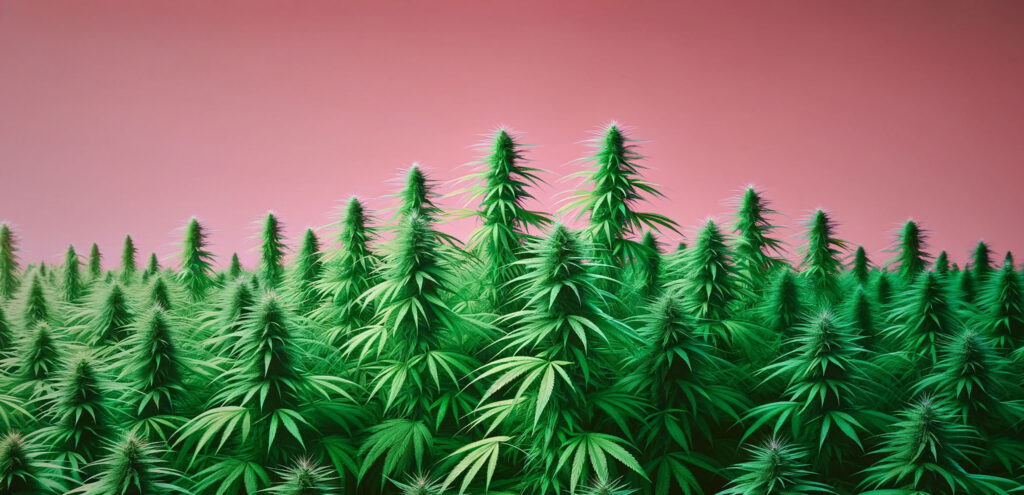The “hemp crop” is increasingly becoming the focus of sustainable innovations. But what are their strengths and possible applications? In this article, we explore how hemp is transforming industries and contributing to ecological balance.
The most important facts at a glance
- Hemp is a versatile and sustainable crop whose fibers, seeds and leaves are used in textiles, food and construction and are an environmentally friendly choice as they require little water and can grow in different climates.
- The possible applications of hemp range from the production of sustainable textiles and allergy-friendly clothing to nutrient-rich food supplements and skin care products, as well as use as a building material and in energy production as biodiesel.
- Hemp cultivation and the use of hemp products are legally regulated in Germany, with a steady trend towards more liberal legislation. The growing acceptance and rising demand for hemp products point to increasing cultivation areas and further innovations in the hemp industry.
Hemp as a versatile crop
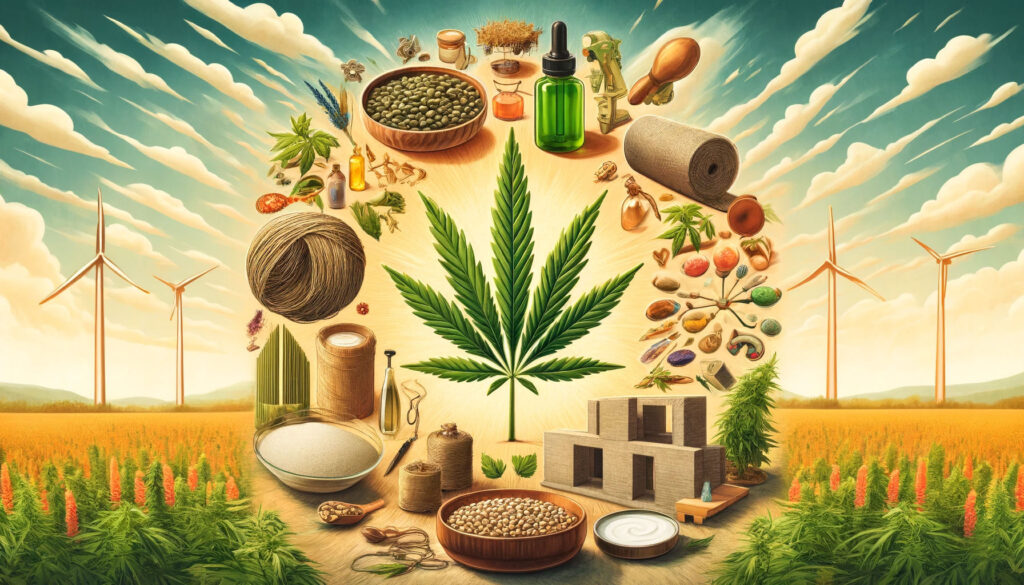
Hemp, often confused with its infamous relative, the marijuana plant, actually has a long history as a crop. Historically, hemp has been used in many different industries, from the textile industry to food production. In fact, the various components of the hemp plant, such as seeds, fibers and leaves, offer a wealth of possible uses. Hemp seeds, for example, are used to produce hemp oil, which is used in food and wellness products to improve nutrition and health.
Another advantage of hemp is its sustainability. The plant grows quickly and requires less water than many other crops, making it an environmentally friendly choice. In addition, hemp is robust and undemanding, which makes it ideal for cultivation in different climate zones.
But hemp is not only an environmentally friendly choice, it also offers a multitude of benefits for human health. The plant contains cannabidiol (CBD), a compound known for its calming effects and used to treat a variety of health problems.
Textiles and fibers
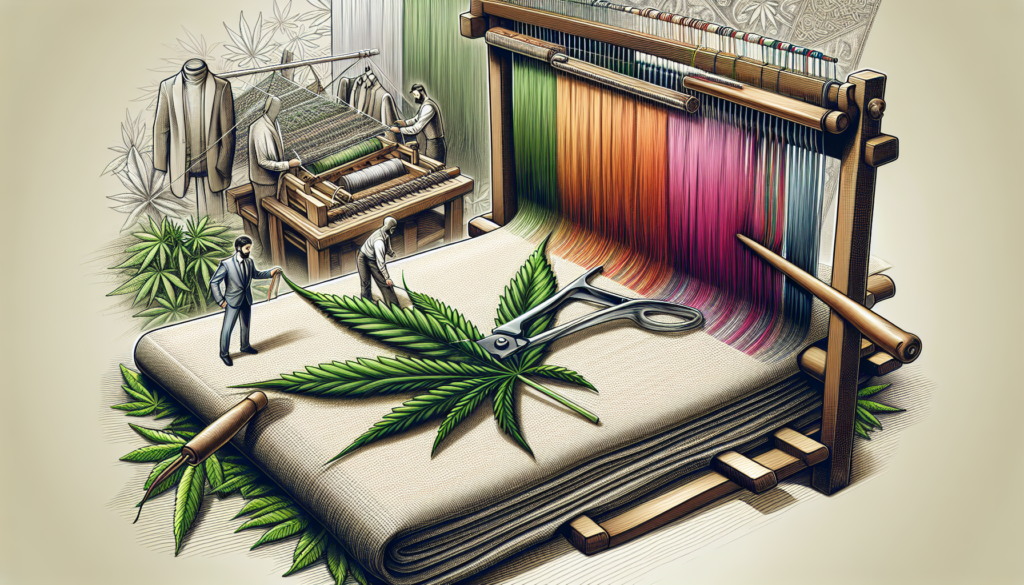
Hemp has proven to be particularly useful in the textile industry. Hemp fibers are tear and wet strength and offer even greater wet strength than dry strength. This robustness, combined with the ability to dry quickly and offer high UV protection, makes hemp an ideal choice for the production of textiles. In addition, hemp textiles are particularly allergy-friendly, as the fiber has antibacterial and antimicrobial properties.
In addition to their durability and robustness, hemp fibers also offer an environmentally friendly advantage. Compared to cotton, they require less water and are therefore a more sustainable choice. They are mainly used in the clothing industry and for technical textiles. In addition, hemp textiles require fewer washes due to their robustness and are therefore more resource-efficient to maintain.
Food and food supplements
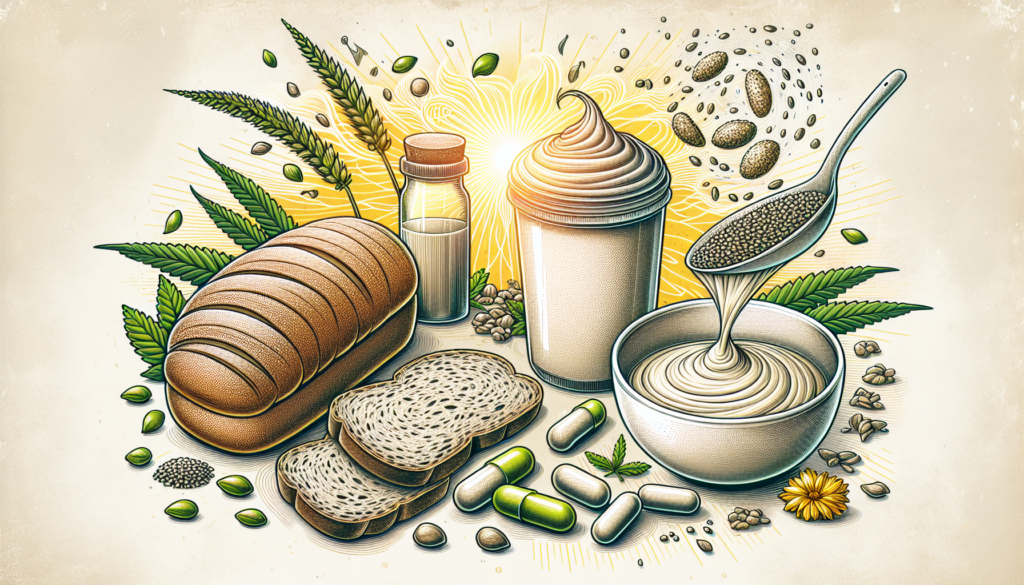
Hemp seeds are a real nutrient bomb. They contain a variety of important nutrients such as:
- Iron
- Potassium
- Magnesium
- B vitamins
- Vitamin E
- Zinc
- high-quality proteins
- an optimal ratio of omega-3 and omega-6 fatty acids
These nutrients not only contribute to general health, but also offer specific health benefits. For example, the high concentration of essential fatty acids in hemp seeds can contribute to heart health and support normal brain function. In addition, hemp seeds strengthen the immune system, promote the elimination of toxins and support healing processes.
And it doesn’t stop at the health benefits. Hemp seeds are also an excellent source of vegetable protein and are therefore particularly suitable for vegetarians and vegans. In addition, they are safe for people with gluten and lactose intolerance and can therefore serve as a safe food source.
With up to 25 percent protein and high biological value, hemp protein could serve as a sustainable and locally produced alternative to soy or pea protein in food production in the future.
Cosmetics and skin care

In addition to its use in food and textiles, the hemp plant has also found its way into the cosmetics industry. Hemp in cosmetic products supports skin health through its:
- antibacterial properties
- antimicrobial properties
- anti-inflammatory properties
- calming properties
In addition, hemp seed oil provides antioxidant benefits with vitamin E and zinc to protect the skin from free radicals.
Hemp oil is used in a variety of products, from moisturizers and shower gels to ointments and shampoos. It improves skin elasticity, removes dirt and oil without stripping moisture, and can even reduce wrinkles and fine lines. In addition, CBD, a cannabinoid from hemp, helps to reduce inflammation and alleviate skin problems such as acne and psoriasis.
Cultivation and harvesting of hemp
Hemp is a robust and undemanding plant that can be grown in many different climate zones. It requires a temperate climate with good sunlight and a sufficient water supply. Its deep taproot can also draw water from deeper layers of soil, which makes it particularly resistant to drought. However, watering times should be adjusted in hot weather to prevent dehydration.
The cultivation of hemp begins with sowing between mid-March and mid-April for fiber hemp and between the end of April and the end of May for seed hemp. Depending on the intended use, the hemp is harvested at different times. Hemp for fiber is harvested when the male flowers are in full bloom and the crop is left in the field to roast, while hemp for oil is harvested from September and the seeds are harvested with a modified combine harvester.
Variety selection and approval
In Germany, only industrial hemp varieties with a THC content of less than 0.2 percent may be cultivated in order to prevent the production of marijuana or hashish. There are over 90 hemp varieties approved for cultivation in the EU, including Cannabis Sativa, which are listed in the annually updated catalog of varieties published by the Federal Office for Agriculture and Food (BLE).
Only certified seeds are permitted for agricultural cultivation in Germany and the reproduction of hemp is prohibited. Choosing the right variety can have a major impact on the yield and quality of the harvest. It is therefore important to carefully consider which varieties are best suited to the specific growing conditions and intended use.
Location and crop rotation
Hemp produces the best yields on deep, humus-rich, calcareous and nutrient-rich soils with a regulated water supply. The pH value of the soil for hemp cultivation should be neutral to slightly alkaline, while waterlogging and compacted soil should be avoided. Hemp grows best in climates with moderate temperatures and sufficient, but not excessive, sunlight, where the plant’s position is optimal.
In addition to the ideal site conditions, crop rotation also plays an important role in hemp cultivation. Hemp has a positive effect on the following crops through high weed suppression, soil loosening and improvement of soil fertility. This makes hemp an attractive option for farmers looking for more sustainable cultivation methods.
Hemp in construction

The use of hemp in construction has increased in recent years as it offers a sustainable and environmentally friendly alternative to traditional building materials. Hemp materials contribute to a negative CO2 balance and are therefore a sustainable choice for environmentally conscious building owners. Hemp lime, for example, meets current energy standards for residential buildings, making additional insulation superfluous.
Hemp insulation materials are effective in thermal insulation, soundproofing and indoor humidity regulation and are suitable for various applications in the construction industry. In addition, buildings made of hemp materials can promise longevity and a positive influence on the indoor climate.
At the end of their life cycle, the hemp products used can be recycled or biodegraded.
Hempcrete
Hempcrete is a concrete formulation made from hemp that is seven times stronger than conventional concrete, but only half as heavy and three times more flexible. These unique properties make Hempcrete an attractive alternative to traditional concrete in various construction applications.
In addition to its load-bearing capacity, Hempcrete also offers other advantages such as
- Thermal insulation
- Fire protection
- Improving the room acoustics
- Regulation of the room humidity
- Protection from the summer heat
With its increasing popularity as a sustainable building material, the further development of Hempcrete through innovative technologies such as 3D printing is to be expected.
Insulation materials and cladding
Hemp is also used as an insulating material. Hemp insulation materials provide effective thermal insulation, improve soundproofing and regulate the humidity in the room, which prevents mold growth. They have technical characteristics that underline their efficiency as an insulating material, including
- a thermal conductivity of approx. 0.040 W/mK
- a long service life
- a low diffusion resistance coefficient
- high specific heat capacities.
The flexibility of hemp insulation materials allows them to be adapted for various applications in the construction industry, e.g. for rafters or support posts, and their suitability even for old buildings underpins their practicality and easy recyclability. A growing interest and commitment to research and development in the construction industry is reflected in new technologies for hemp as a building material and the increasing number of collaborations in this field.
Hemp in energy production
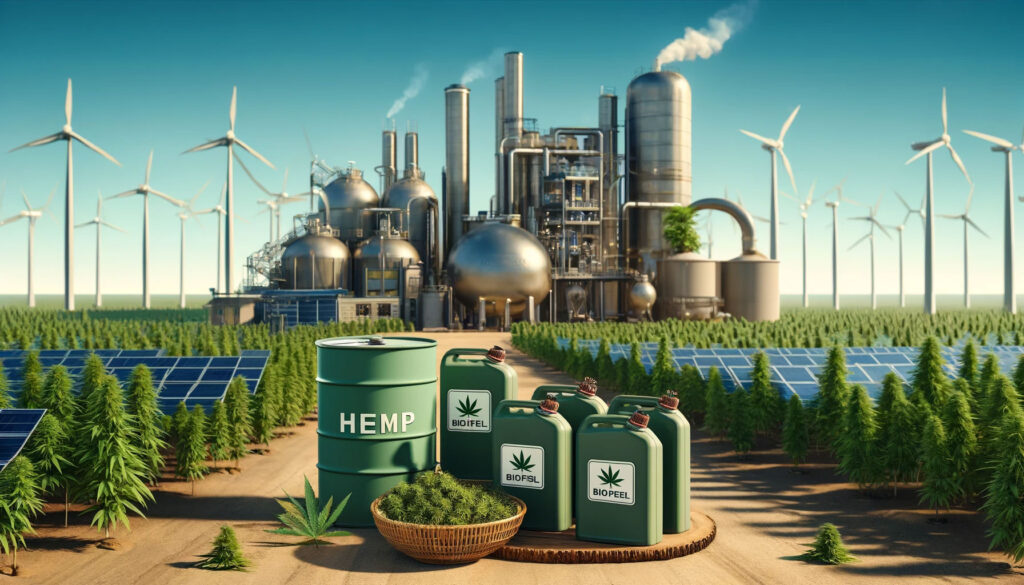
In addition to its uses in textiles, food and construction, hemp also has potential in energy production. Hemp oil can be used as renewable and sustainable biodiesel in conventional diesel engines, making it a fully renewable and sustainable resource. The entire plant can be used for the production of hemp biofuel, which helps to minimize waste production and make the process more efficient.
Using pyrolysis technology, fuel oils can be extracted from hemp biomass, which contributes to the sensible use of waste products from hemp production. Pyrolysis is a thermal decomposition process that is carried out at high temperatures and in the absence of oxygen. This process makes it possible to obtain a variety of products from hemp, including liquid fuels that can serve as an alternative to fossil fuels.
Biodiesel
Hemp oil, which is obtained by pressing hemp seeds, can be refined into biodiesel. This biodiesel can be used in any diesel car, making it an immediately usable and practical alternative to fossil diesel.
Another advantage of hemp biodiesel is its higher fluidity at cold temperatures compared to biodiesel from other sources such as rapeseed. This makes hemp biodiesel particularly attractive for use in colder climates, where the fluidity of fuels at low temperatures can be a critical factor.
Bioremediation of contaminated soils
Hemp can also be used to clean contaminated soil, a process known as phytoremediation. The hemp plant absorbs toxins and heavy metals from the soil and stores them in its stems and leaves. This process can help to clean contaminated soils and make them usable for cultivation again.
Phytoremediation with industrial hemp has already been used successfully to clean soil after industrial pollution and nuclear accidents. Hemp has a strong root system that can grow up to 2.5 meters deep, allowing it to absorb deep-seated pollutants from the soil. This method has the potential to rid our world of dangerous pollutants.
Industrial hemp is particularly suitable for phytoremediation as it is undemanding and can thrive on depleted or nutrient-poor soils.
Legal situation and future prospects
Hemp cultivation and the use of hemp products are subject to certain legal regulations in Germany. The general ban on hemp cultivation in Germany was lifted on April 16, 1996. Hemp foods, hemp cosmetic products and CBD oils may be sold, while products with THC content such as flowers are strictly regulated.
Despite these legal restrictions, the recent partial legalization of cannabis for adults in the Bundestag signals an increasing acceptance of hemp products. This development could help to change the legal framework for hemp cultivation and the use of hemp products and promote greater acceptance and distribution of hemp products.
Legal regulations
In Germany, hemp foods, hemp cosmetic products and CBD oils are freely available for sale. The THC content of industrial hemp varieties approved for cultivation in the EU may not exceed 0.2 percent, in Italy even up to 0.6 percent.
The partial legalization of cannabis in Germany has come into force. This allows the possession, private cultivation and consumption of certain quantities of cannabis for adults. This regulation came into force on April 1, 2024. The regulations on self-cultivation in cultivation associations come into force on July 1, 2024.
Private individuals who do not practise agriculture as a profession or independently are not allowed to grow “industrial hemp” in Germany. It is a legal requirement that only certified seeds may be used for the cultivation of industrial hemp. This ensures that the quality and purity of the plants is guaranteed.
Future trends and innovations
The area under hemp cultivation in Germany has increased fifteen-fold in the last seven years. This indicates a growing popularity of hemp products and an increasing acceptance of hemp as a crop. This development is supported by a steadily increasing demand for hemp seeds and hemp oil, especially from the organic sector.
Companies such as Signature Products GmbH support the spread of hemp products in Germany by coordinating cooperation between farmers, regional processors and food retailers. With the increasing demand and acceptance of hemp products, further innovations and developments can be expected in this area.
Summary
In this blog post, we have examined the many applications and benefits of hemp products in detail. From textiles and food to building materials and energy production, hemp has the potential to offer a sustainable and environmentally friendly alternative to traditional resources. Despite legal restrictions, the recent partial legalization of cannabis in Germany signals an increasing acceptance of hemp products. With the increasing demand and acceptance of hemp products, further innovations and developments can be expected in this area. Hemp therefore has the potential to play a key role in a more sustainable and environmentally friendly future.
